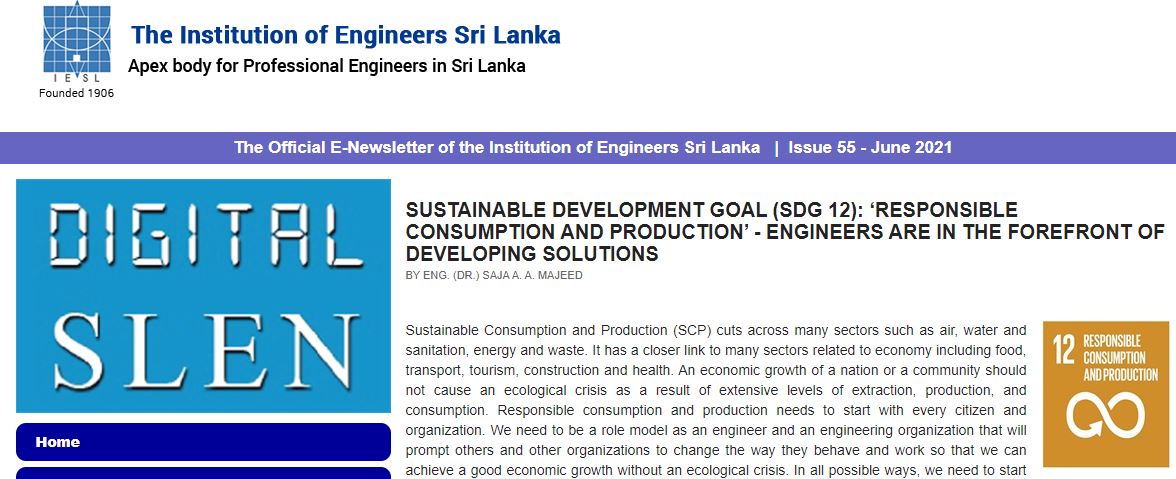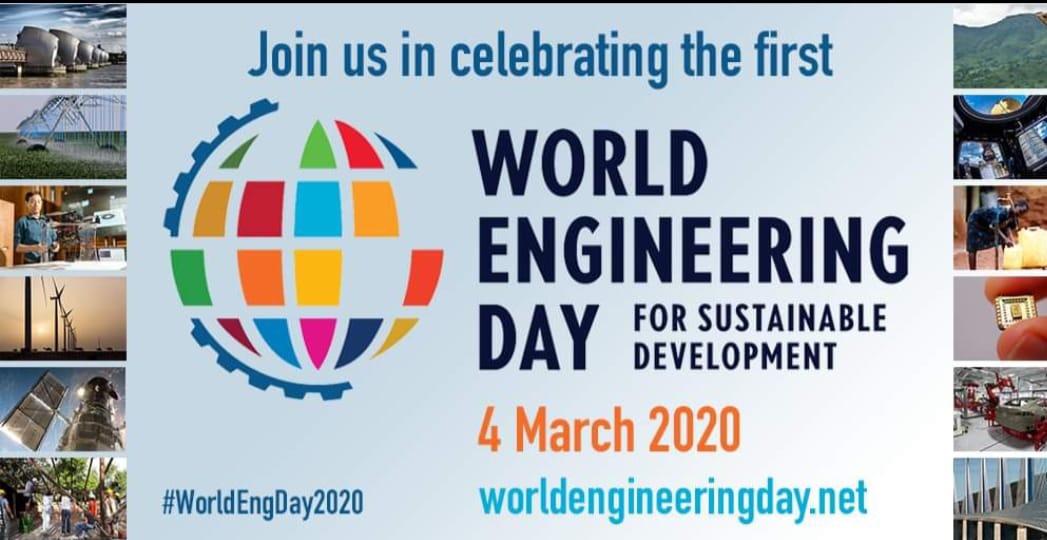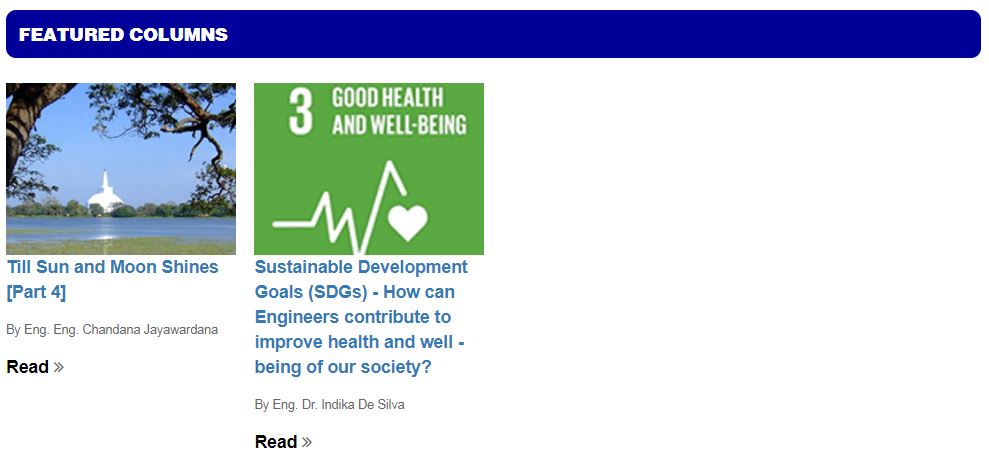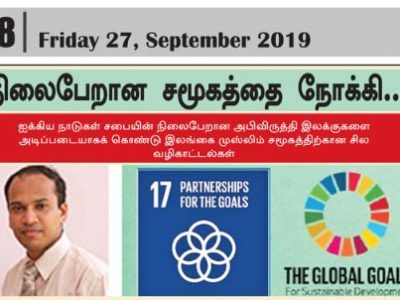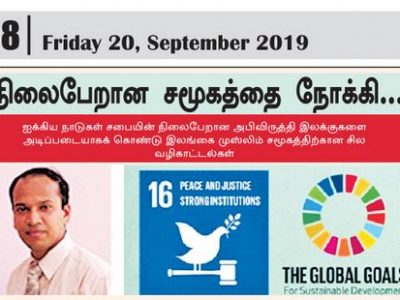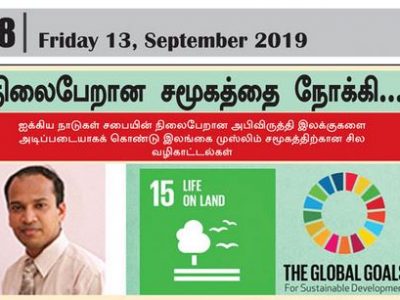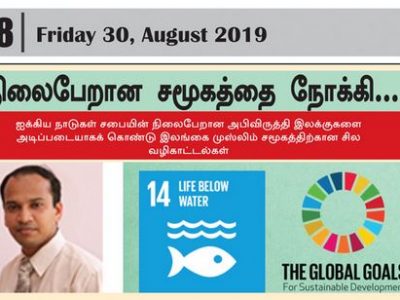Sustainable Development Goals (SDGs) – A local perspective for Engineers: Foreword
| Eng. Saja A.A.Majeed BScEng (Hons), MScEng PhD Scholar, Queensland University of Technology, Australia Lecturer, Faculty of Engineering,SEUSL,Oluvil , Associate Member, IESL; Member, RedR UK Available online at http://www.iesl.lk/article_sdg?fbclid=IwAR3–R7FxpbDeCXVsLr8jtc4XGE4lrJhn39e3kFe_lcWIOQX3RKjk3Q-lP0 |
|---|
Engineers play key role in many part of the professional and social life – be it technical, management, economy, social, political, legal, and environment. The job and work of Engineers are increasingly becoming multi-faceted and interdisciplinary. Engineers contribute in many ways and multiple platforms of national, regional, and community development. Some of the key contribution of Engineers work include developing a healthy society and contribute to productive development growth, provision of access to reliable and affordable energy systems, provision of access to clean water and sanitation, and building resilient infrastructure, transport systems, and industries. The Sustainable Development Goals (SDGs) related to the above sectors are key to support the achievement of other SDGs and engineers have a lead role to play. Given the stronger roots of sustainability and resilience science in Engineering, wide range of engineering approaches to tackling sustainability and/or resilience have been given more prominence in a more complex and challenging development context across the globe.
The Sustainable Development Goals (SDGs) were officially launched by the United Nations in October 2015 under ‘agenda 2030’ and with the motto of ‘Leaving no one behind’. SDGs strive toward achieving 17 global targets that have become the cornerstone of any national, regional, and local agenda of the states across the globe. An engineering perspective can be easily articulated across all 17 SDGs not only from the policy maker point of view, but utmost important for researchers and practitioners alike. The world and countries have now been driving towards achieving 17 high level themes, a long list of 169 targets, and 244 indicators proposed in the UN SDGs by 2030. At the core and minimum level, energy (SDG 7), clean water and sanitation (SDG 6), Industry/Innovation/Infrastructure (SDG 9), Sustainable cities and communities (SDG 11), and Responsible consumption and production (SDG 12) have direct linkages to Engineering and largely driven by Engineering portfolios.
For example, “in achieving the SDGs, engineers will be challenged to meet the needs of a growing global population while minimising the pressure on our planet’s resources, and will need to focus on resource consumption in a way that does not exceed ecological limits” (Rahimifard and Trollman 2018, 1). Ignition of new ideas, transformation of processes, innovation in our products and services, and incubation of new skills are needed to achieve SDGs from local to global level. The younger generation of our society – particularly STEM students need to be also educated and made aware of the SDGs and the role they can play by starting small scale community level projects through service learning modules in the universities and colleges.
From a national perspective, the Department of Census and Statistics (DCS) have compiled set of baseline data for nationally relevant SDGs. For example, for SDG 6 – ‘ENSURING AVAILABILITY AND SUSTAINABLE MANAGEMENT OF WATER AND SANITATION FOR ALL’, target 6.1: By 2030, achieve universal and equitable access to safe and affordable drinking water for all, and corresponding indicator 6.1.1: Proportion of population using safely managed drinking water services, the baseline stands at 80.9% of the population using safely managed drinking water services in 2012 in Sri Lanka (DCS 2017). Recent review of SDG progress by the Government of Sri Lanka reported that around 88.8% of households have access to safe drinking water (Target 6.1) as at 2016. Similarly, under SDG 7 – ‘ENSURING ACCESS TO AFFORDABLE, RELIABLE, SUSTAINABLE AND MODERN ENERGY FOR ALL’, target 7.1: By 2030, ensure universal access to affordable, reliable and modern energy services, and corresponding indicator 7.1.1. Proportion of population with access to electricity, the baseline stands at 87% of the population with access to electricity in 2012 in Sri Lanka (DCS 2017). SDG review 2018 reported near universal coverage of domestic supply of electricity, reaching nearly 100% households in the country, achieving the SDG target 7.1. Of course there are other targets and indicators in each of the SDG. A lot of discussion needs to happen around other targets and indicators as well to progress towards overall achievement in each of the sector. This brief write up series every month aimed to give a snapshot of each SDG, their status in Sri Lanka, and how it is linked or potentially relevant to Engineering profession. There are many questions than answers and the need for critical debate starting at the community and local levels beyond statistics and reporting the achievement of SDGs.
Next month, we will start with the snapshot of SDG 1: No Poverty. Until then, let us reflect on overall SDGs and their implication to Engineering profession. Your comments on how we as Engineers can contribute to achieve SDGs can be posted in the following IESL Facebook page https://www.facebook.com/IESLSriLanka/ .
Further reading:
Rahimifard, Shahin and Hana Trollman. 2018. “UN Sustainable Development Goals: an engineering perspective.”International Journal of Sustainable Engineering 11 (1): 1-3.https://doi.org/10.1080/19397038.2018.1434985. doi: 10.1080/19397038.2018.1434985.
Department of Census and Statistics – Sri Lanka. 2017. “Status of Sustainable Development Goals -Indicators in Sri Lanaka 2017”, http://www.statistics.gov.lk/sdg/application/publications/book.pdf
Ministry of Sustainable Development,Wildlife and Regional Development (MSDWRD). 2018.
Sri Lanka Voluntary National Review on the Status of Implementing Sustainable Development Goals (Link)
